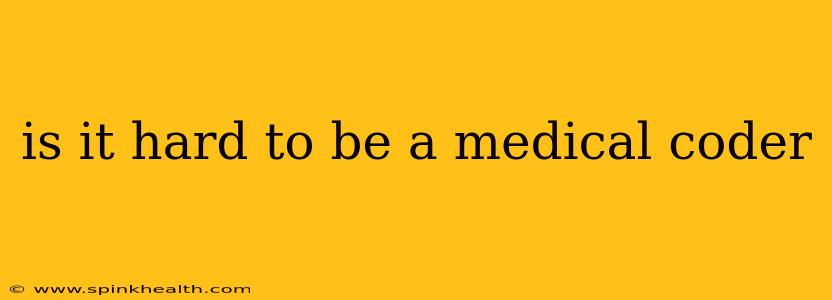Is It Hard to Be a Medical Coder? A Journey Through the Numbers
The question, "Is it hard to be a medical coder?" isn't easily answered with a simple yes or no. It's more like asking, "Is it hard to be a chef?" The answer depends on your skills, dedication, and the specific path you choose. Let's unpack this, exploring the challenges and rewards of a career in medical coding.
My own journey into the world of medical coding began with a fascination for detail and a love for problem-solving. I wasn't a medical professional, but the intricacies of transforming medical charts into standardized codes captivated me. What I quickly discovered was that while the work is undeniably detailed and demanding, it's also incredibly rewarding.
What Makes Medical Coding Challenging?
The Complexity of Medical Terminology: This is arguably the biggest hurdle. Medical terminology is dense, with many abbreviations, complex words, and nuanced meanings. Imagine deciphering a language entirely foreign to you initially. Mastering this requires significant study and consistent effort. It's a marathon, not a sprint. The sheer volume of terms and their subtle variations can be overwhelming.
Staying Up-to-Date with Changes: The healthcare industry is constantly evolving, and so are the coding systems (primarily the ICD and CPT codes). Regular updates, new codes, and coding guidelines demand continuous learning. Failing to stay current can lead to inaccurate coding, which has serious financial and legal consequences for healthcare providers. Consider it a journey of perpetual learning, a challenging yet essential aspect of the job.
High Levels of Accuracy and Attention to Detail: One misplaced digit or a slight misinterpretation of a medical record can lead to incorrect claims and reimbursement denials. Accuracy is paramount. This requires extreme focus, patience, and meticulous attention to detail – the slightest error can have significant repercussions.
Repetitive Work: While intellectually stimulating, a large portion of a medical coder's day involves reviewing and coding medical records. For some, the repetitive nature of the work might prove challenging, but effective time management and a methodical approach can help mitigate this.
Software and Technology: Proficiency in various coding software and electronic health record (EHR) systems is crucial. Learning these systems takes time and consistent practice. New updates and changes in technology need ongoing adaptation.
Is It Hard? A More Nuanced Answer.
The difficulty of medical coding depends on individual aptitude and dedication. If you're detail-oriented, enjoy problem-solving, possess strong analytical skills, and are committed to continuous learning, you might find it challenging yet manageable. If you struggle with tedious tasks, have a low tolerance for error, or dislike constant learning and adaptation, you may find it exceptionally difficult.
H2: What are the common difficulties faced by medical coders?
This is similar to the challenges already discussed, but allows us to delve deeper into specific examples:
- Deciphering illegible handwriting: Many medical coders struggle with deciphering poorly written doctor's notes, highlighting the importance of strong interpretation skills.
- Keeping up with coding changes: The constant updates to ICD and CPT codes mean coders need excellent time management to stay informed and avoid mistakes.
- Understanding complex medical procedures: Grasping the nuances of intricate medical procedures and accurately translating them into codes requires both medical knowledge and coding proficiency.
- Dealing with insurance denials: Understanding the reasons for denials and appealing them effectively is a crucial yet challenging aspect of the job.
- Managing high workload: Meeting deadlines while maintaining accuracy and efficiency in a high-volume environment is a common pressure point.
H2: How can I overcome the challenges of being a medical coder?
Overcoming these challenges requires a multi-pronged approach:
- Formal Education: Pursuing a certified medical coding program offers structured training and ensures you receive adequate preparation.
- Continuous Learning: Staying up-to-date with coding changes and industry trends is crucial. Consider online courses, workshops, and professional certifications.
- Effective Time Management: Developing strong time management skills is vital for managing a heavy workload and meeting deadlines.
- Building a Strong Support Network: Connecting with other medical coders provides opportunities for collaboration, mentorship, and peer support.
- Developing Strong Analytical and Problem-Solving Skills: These skills are essential for accurately interpreting medical records and resolving coding challenges.
In conclusion, while medical coding presents significant challenges, it's a rewarding career for those with the right aptitude, dedication, and commitment to lifelong learning. It's a field that requires constant attention to detail, but for those who enjoy the intricacies of healthcare and the precision of accurate coding, the rewards are significant. The journey is demanding, but the destination – a fulfilling career in a vital healthcare sector – is well worth the effort.

